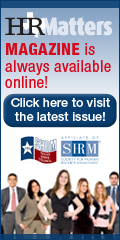
August 2013
| Archives/Subscribe | Advertise | HR Matters | www.texasshrm.org |
Corporate Culture: Behaviors that Define the Uniqueness in Corporations by MeLisa Rogers, Ph.D. This is the first segment of a mini-series that discusses the behavioral aspects of corporate culture.
If you have been involved in an organization where things are going smoothly, performance is optimum, it’s a well-oiled machine and you feel excited and enthused about going to work every day, chances are you are in a corporate culture that suits you well. On the other hand, in the event you had to change jobs for whatever reason and you now find yourself struggling with success in this new environment and not really understanding why, it may not be you at all. Chances are it’s the corporate culture.
Think about the various corporate cultures that you may have been involved in throughout your career. Were you "on a roll" or was your enthusiasm squelched? Did your performance soar or suffer? Did you tackle assignments with ease or lack motivation to do your job? As career builders, we think of salary and responsibility and maybe even geographic location, but the uniqueness of the culture usually doesn’t rank in the top three. Likewise, as we select individuals into our organizations we often reference cultural fit, but how likely is it that we turn away a star candidate who is "head and shoulders above the rest" because of a cultural mismatch? We envision this candidate going through cultural integration within our organization while boasting about our unique organization. Emphasis isn’t always placed on culture in the decision-making process as a job seeker or as a hiring manager.
Studies show that if you put a good performer in a poor work environment, the environment will win every time (Gilbert, 1997). The careers industry touts the statistic of 75% people being unhappy in their current employment. This figure suggests that corporate culture has a greater influence on performance and workplace satisfaction than might be realized. Therefore, it helps to understand the influence of corporate culture on an individual’s success.
There are typically four different types of culture: power culture, role culture, task culture, and person culture (Jones & Robinson, 2012).
Power Culture:
Power culture depends on a central power source, such as the founder of the company. Individuals and relationships are emphasized over expertise and knowledge in the power culture. This is an environment of who you know, not what you know. The power culture is highly results-oriented but very abrasive. Gut instinct is used for decision making and few rules apply. Athletic organizations are an example of a power culture (Jones & Robinson, 2012).
Role Culture:
Role culture is also known as a process culture and can be highly bureaucratic as well as logical and rational. It is very procedural where managers and employees are careful to follow rules and regulations in a highly structured environment with very clear lines of leaderships. The role culture is reliable, stable and predictive but may not offer much creativity. An example of a role culture is a health services organization such as a hospital (Jones & Robinson, 2012).
Task Culture:
Task cultures are typically found in high-risk types of environments such as explorative, developmental and project-oriented. Teams and task forces make - up the task culture where there is a great deal of creativity and cross-function. While the environment lacks stability, it offers excitement and opportunities to quickly build experience by serving in many roles. Task cultures are found in startups or exploratory operations, such as oil and gas ventures (Jones & Robinson, 2012).
Person Culture:
A person culture is an individualistic type of culture. Employees have a great deal of autonomy and freedom with a key responsibility of serving other people. An individual’s people skill is the preferred management style in this type of culture. A person culture can be found in universities and consulting firms (Jones & Robinson, 2012) .
General features of organizational culture can be the following:
One thing that we must remember is that people define corporate culture (Jones & Robinson, 2012). While corporate culture is embedded deep in an organization, it typically carries on the personae of the founder. Therefore, creating an optimum behavior match between a corporation’s unique culture and their employees by identifying the behavior style of each may lead to enhanced performance and employee satisfaction. Which corporate culture do you see yourself? In our next segment we will look more closely at behavior styles in relation to the types of culture.
|
|
P.O. Box 8058
Tyler, Texas 75711
www.texasshrm.org • info@texassshrm.org • 214-354-8740



